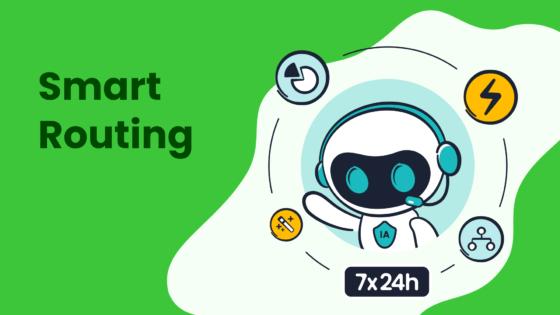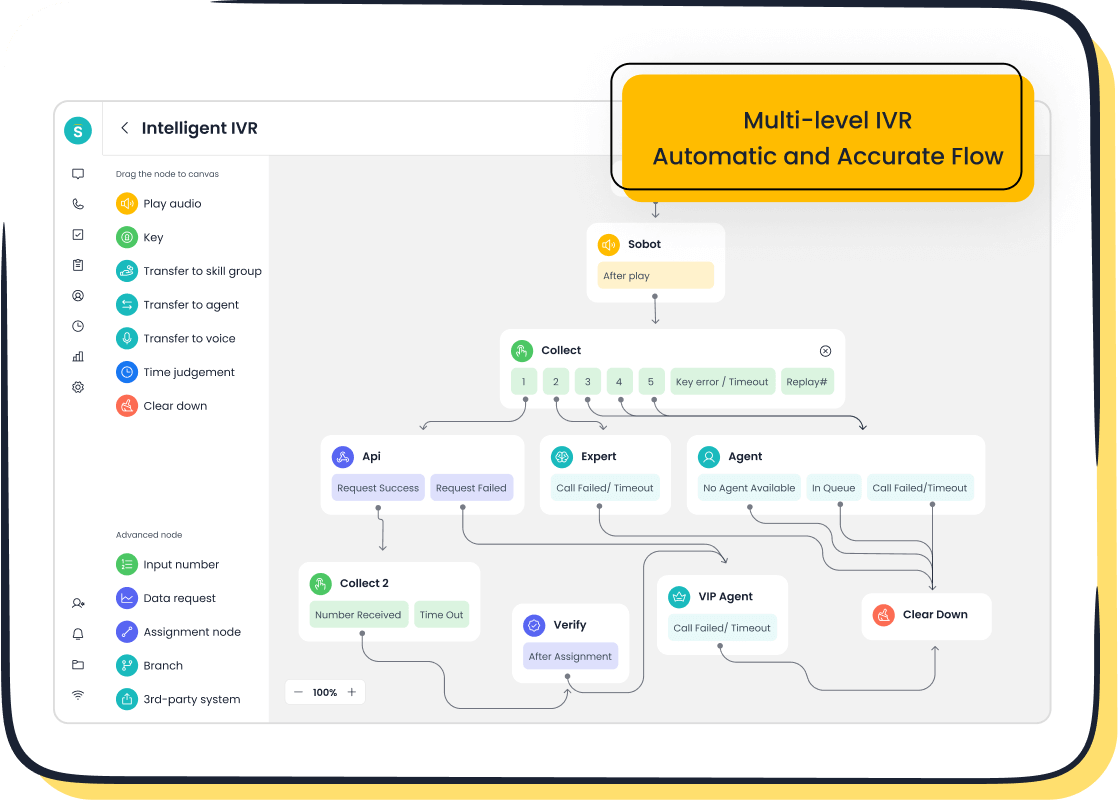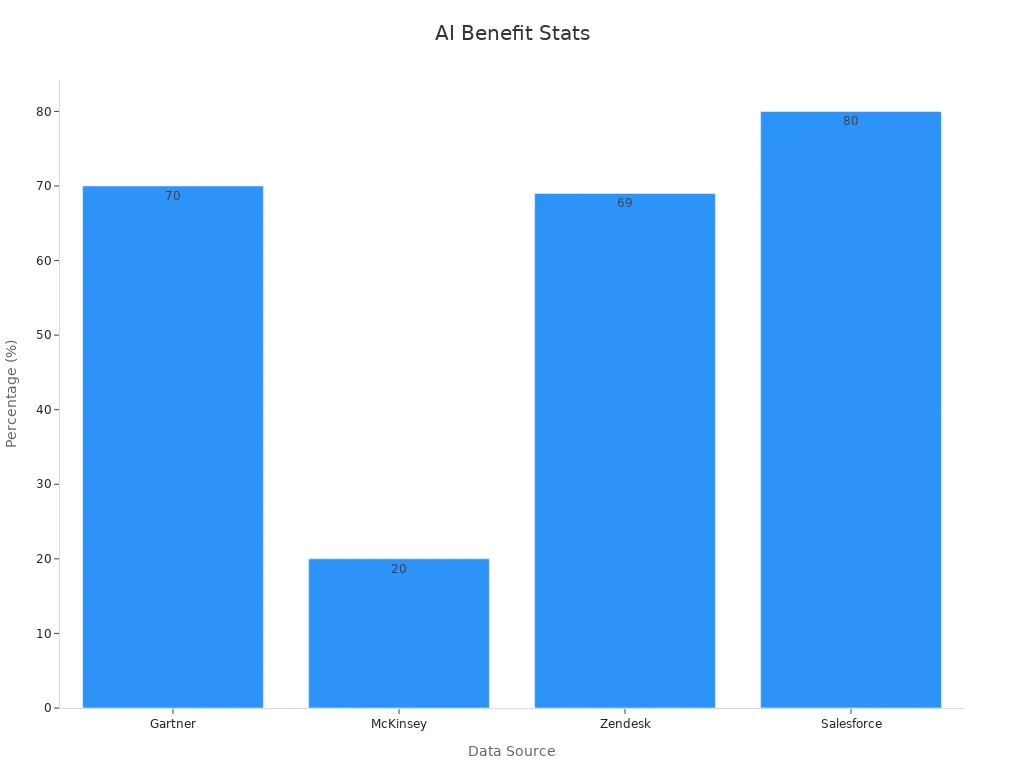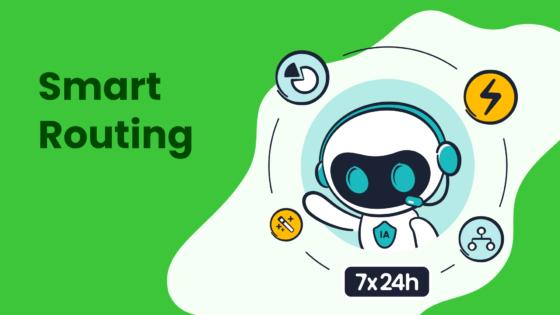How AI Call Center Agents Transform Customer Interactions

Artificial intelligence for call centers is reshaping customer service by improving efficiency and satisfaction. AI agents automate repetitive tasks, such as routing calls, freeing human agents to focus on complex problems. They provide real-time support, reducing Average Handle Time (AHT) and boosting First Call Resolution (FCR). For instance, a bank streamlined its inbound call routing process and increased call center efficiency by two-thirds. AI tools also enhance self-service capabilities, allowing customers to resolve inquiries independently, which reduces costs per call. Solutions like Sobot’s AI-powered Voicebot ensure seamless, personalized interactions, helping businesses scale globally while maintaining high service standards.
What Are AI Call Center Agents?
Definition of AI Call Center Agents
AI call center agents are virtual assistants powered by artificial intelligence. They are designed to handle customer interactions across various communication channels, such as phone calls, live chat, and email. Unlike human agents, these AI assistants can operate 24/7, providing instant responses and managing multiple inquiries simultaneously. They rely on advanced technologies like natural language processing (NLP) and machine learning to understand customer queries and deliver accurate, context-aware solutions.

The evolution of artificial intelligence for call centers has transformed how businesses approach customer service. In the 1990s, early AI applications focused on automating simple tasks like call routing. Today, AI agents leverage real-time data and predictive analytics to offer personalized experiences. For example, Sobot’s AI-powered Voicebot uses intelligent interaction and intent recognition to streamline communication, ensuring faster resolutions and higher customer satisfaction.
| Aspect | Human Agents | AI Call Center Agents |
|---|---|---|
| Interaction Speed | Limited to one call at a time, causing delays | Instant responses, managing multiple interactions |
| Consistency of Responses | Varies based on agent's emotional state | Consistent and accurate responses based on data |
| Operational Costs | Higher due to large workforce | Reduced costs by automating routine tasks |
| Data Handling | Prone to errors due to lack of information | Accesses real-time data for accurate information |
| Emotional Intelligence | Capable of empathy and complex judgment | Lacks emotional intelligence, but efficient in routine tasks |
| Future Potential | Limited scalability | Potential for full automation in the future |
Core Functions in Customer Support
AI call center agents perform several critical functions that enhance customer support. These include:
- Handling Routine Inquiries: AI assistants can answer frequently asked questions, such as order status or return policies, without human intervention. This reduces the workload on human agents.
- Call Routing: AI agents use intelligent IVR systems to route calls to the appropriate department or agent based on the customer’s needs.
- Real-Time Assistance: By analyzing customer data instantly, AI agents provide accurate solutions during live interactions. For instance, Sobot’s unified workspace integrates customer information, enabling seamless support.
- Multilingual Support: AI-powered virtual assistants can communicate in multiple languages, making them ideal for businesses with a global customer base.
- Data Analysis: AI agents process large volumes of data to identify trends and provide actionable insights. This helps businesses improve their service strategies.
For example, Lemonade Insurance implemented AI customer support assistants to reduce claim processing time by 30%. These AI agents also improved customer satisfaction scores by 27% and retention rates by 25%.
Role in Call Center Automation
AI call center agents play a pivotal role in call center automation by streamlining operations and enhancing efficiency. They automate repetitive tasks, such as call logging and quality assurance, allowing human agents to focus on complex issues. AI also evaluates call transcripts to ensure compliance with service standards, improving overall quality.
Key benefits of call center automation include:
- Improved Productivity: AI agents handle high volumes of interactions, reducing the need for a large workforce.
- Personalized Interactions: By analyzing historical data, AI agents tailor responses to individual customers, leading to higher satisfaction rates.
- Enhanced Metrics: The integration of AI shifts performance metrics from call duration to customer satisfaction and resolution rates.

Sobot’s AI solutions exemplify the power of automation. With features like smart call routing and real-time monitoring, Sobot’s Voice/Call Center ensures efficient operations. Businesses using Sobot’s technology have reported significant improvements in first-call resolution rates and reduced average handle times.
Tip: Implementing AI in your call center not only reduces costs but also enhances customer experience. Start small by automating routine tasks and gradually expand to more complex processes.
How Do AI Call Center Agents Work?
Technologies Behind AI Call Center Agents
AI call center agents rely on cutting-edge technologies to deliver efficient and personalized customer support. These technologies include artificial intelligence, machine learning, and natural language processing (NLP). Together, they enable AI agents to understand customer queries, analyze data, and provide accurate responses.

For example, AI-powered automation tools like Sobot’s Voice/Call Center solutions use intelligent IVR systems to route calls based on customer needs. These tools also integrate with CRM systems, ensuring seamless access to customer data. By leveraging AI, businesses can automate repetitive tasks, such as call logging and routing, which reduces operational costs and improves efficiency.
The widespread adoption of AI technologies in customer service is evident. According to Gartner, 70% of customer interactions now involve emerging technologies like chatbots. This trend highlights the growing reliance on AI agents to meet customer expectations for quick and accurate responses.

Natural Language Processing (NLP) and Machine Learning
NLP and machine learning are the backbone of AI call center agents. NLP enables natural language communication by allowing AI agents to understand and interpret human speech or text. Machine learning helps these agents improve over time by analyzing past interactions and adapting their responses.
For instance, when you contact an AI-powered call center, NLP ensures the agent understands your query, even if it includes slang or complex phrasing. Machine learning then uses this data to refine the agent’s performance, ensuring better accuracy in future interactions.
The benefits of these technologies are supported by data. Businesses using sentiment analysis, a form of NLP, have improved customer retention rates by 20%, according to McKinsey. Additionally, Salesforce reports that 80% of customers expect immediate responses, which AI agents powered by NLP and machine learning can deliver effectively.
| Source | Statistic | Description |
|---|---|---|
| Gartner | 70% of customer interactions involve emerging technologies like chatbots. | This indicates the widespread adoption of AI technologies in customer service interactions. |
| McKinsey | Businesses using sentiment analysis improve customer retention rates by 20%. | Highlights the effectiveness of AI in enhancing customer loyalty and retention. |
| Zendesk | 69% of consumers prefer chatbots for quick answers. | Demonstrates consumer preference for AI solutions in providing immediate responses. |
| Salesforce | 80% of customers expect immediate responses to their inquiries. | Reflects the demand for quick service, which AI can help fulfill effectively. |
Automation Tools and Real-Time Data Processing
Automation tools and real-time data processing are essential for AI call center agents. These tools allow AI agents to monitor calls, analyze data, and provide actionable insights instantly. For example, Sobot’s Voice/Call Center solutions use real-time monitoring to track call performance and identify areas for improvement.
AI-powered automation enhances efficiency by reducing the need for human intervention in routine tasks. It also improves customer satisfaction by delivering faster and more accurate responses. Real-time data processing enables AI agents to tailor interactions based on customer history, ensuring a personalized experience.
Key benefits of automation include:
- AI call monitoring provides real-time insights into conversations, enabling agents to respond more effectively.
- The technology analyzes call data to identify strengths and areas for improvement, refining team strategies.
- It fosters a culture of continuous improvement, encouraging proactive communication and enhancing customer satisfaction.
By leveraging AI-powered automation, businesses can stay competitive while meeting customer needs effectively. Sobot’s solutions exemplify this by integrating AI technologies like chatbots and predictive analytics to optimize operations and reduce costs.
Key Features of AI Call Center Agents

24/7 Availability for Customer Self-Service
AI call center agents offer round-the-clock availability, ensuring uninterrupted service for your customers. This feature empowers customers to resolve their inquiries independently, even outside regular business hours. Whether it's checking order status or troubleshooting a product issue, self-service solutions reduce wait times and improve satisfaction.
| Benefit | Impact |
|---|---|
| 24/7 Availability and Immediate Response | Respond to multiple calls at any time without delays. |
| Cost-Effective and Scalable Solutions | Reduce the need for agents on routine calls while scaling to meet demand. |
A robust 24/7 support system caters to diverse customer preferences and integrates multiple channels into a seamless communication network. For example, Sobot’s AI-powered Voicebot ensures immediate responses and high first-contact resolution rates, helping businesses maintain service quality while reducing operational costs.
Tip: By adopting AI systems, you can enhance customer satisfaction and retention. Metrics like CSAT and NPS often show significant improvement when AI agents handle routine tasks efficiently.
Multilingual Capabilities for Global Reach
AI call center agents break language barriers, enabling your business to connect with customers worldwide. Multilingual capabilities allow customers to communicate in their preferred language, enhancing accessibility and satisfaction. This feature expands your market reach and builds brand loyalty by making customers feel valued and understood.
- Expands market reach by attracting diverse customers.
- Improves business reputation in international markets.
- Increases brand loyalty through personalized communication.
Sobot’s Voice/Call Center solutions include multilingual support, making them ideal for businesses with a global presence. For instance, engaging with non-English-speaking customers opens up new sales opportunities. Many companies overlook these markets, but by offering multilingual service, you can connect with diverse audiences and drive growth.
Data-Driven Insights for Personalized Interactions
AI call center agents leverage data-driven insights to personalize customer interactions. By analyzing historical data and real-time information, these systems tailor responses to individual needs, improving satisfaction and operational efficiency.
- AI-driven personalization uses data insights to customize customer interactions.
- Real-time information enhances service quality and engagement.
- Historical data helps agents personalize conversations, increasing customer loyalty.
Sobot’s AI solutions excel in this area. For example, its unified workspace integrates customer data, enabling agents to deliver seamless and personalized support. AI-powered call centers also track essential KPIs, such as containment rates, to refine strategies and improve decision-making. This approach streamlines processes and ensures your customers receive the best possible service.
Scalability and Adaptability to Business Needs
AI call center agents excel in scalability and adaptability, making them a perfect fit for businesses of all sizes. These systems handle increasing customer demands without compromising service quality. Whether your business experiences seasonal spikes or rapid growth, AI agents adjust seamlessly to meet your needs.
AI-powered call centers operate continuously, managing multiple queries at once. This capability ensures consistent service across all channels, even during peak times. For example, a telecommunications provider implemented IBM Watson Assistant to handle rising customer inquiries. The AI solution improved efficiency by addressing routine questions, freeing human agents for complex tasks. It also reduced average wait times and boosted customer satisfaction. Future plans include expanding to voice interactions and proactive notifications, demonstrating adaptability to evolving requirements.
Sobot’s Voice/Call Center solutions offer similar advantages. With features like bulk outbound tasks and smart call routing, these tools scale effortlessly as your business grows. The platform’s global number availability ensures you can support customers worldwide, while its AI-powered Voicebot provides intelligent, real-time assistance. This adaptability allows you to maintain high service standards, regardless of demand fluctuations.
Scalability also reduces operational costs. AI agents eliminate the need for additional staff during busy periods, saving resources while maintaining productivity. By analyzing real-time data, these systems adapt to customer preferences, ensuring personalized interactions. This flexibility not only enhances customer satisfaction but also positions your business for long-term success.
Tip: Start small by integrating AI into one area of your call center. Gradually expand its role as your business grows to maximize scalability and adaptability.
Benefits of AI Call Center Agents
Improved Customer Satisfaction and Experience
AI call center agents significantly enhance customer satisfaction by delivering faster, more accurate, and personalized service. These agents handle customer inquiries instantly, reducing wait times and improving engagement. For example, 97% of communication service providers report that conversational AI positively impacts customer satisfaction. Additionally, companies using automation have seen satisfaction rates increase by 15% to 20%.
AI agents also ensure consistent service quality. Unlike human agents, they provide uniform responses, eliminating errors caused by fatigue or emotional factors. Multilingual capabilities further improve satisfaction by allowing customers to communicate in their preferred language. Sobot’s AI-powered Voicebot exemplifies this by offering real-time assistance and intent recognition, ensuring seamless interactions across global markets.
Did you know? 80% of call centers now use AI technologies to enhance customer interactions, reflecting the growing demand for efficient and reliable service.
Reduced Operational Costs for Businesses
AI agents reduce operational costs by automating repetitive tasks and minimizing the need for a large workforce. Businesses save an average of $1.5 million annually through automation. Furthermore, 43% of contact centers have adopted AI technologies, achieving a 30% reduction in operational expenses.
AI-driven automation handles routine inquiries like order tracking or FAQs, allowing businesses to allocate resources more effectively. Sobot’s Voice/Call Center solutions streamline operations with features like bulk outbound tasks and smart call routing. These tools not only cut costs but also improve efficiency, enabling businesses to scale without increasing overhead.
Tip: By integrating AI into your call center, you can reduce costs while maintaining high service standards, ensuring long-term profitability.
Enhanced Productivity for Human Agents
AI agents empower employee agents by automating mundane tasks, enabling them to focus on complex customer needs. This reduces burnout and enhances productivity. For instance, AI-based analytics and efficient call routing optimize workflows, improving interaction quality and customer satisfaction.
Generative AI also accelerates agent training. Real-time assistance and sentiment interpretation help agents deliver personalized service, fostering better engagement. Sobot’s unified workspace integrates customer data, allowing agents to access relevant information instantly. This seamless collaboration between AI and human agents ensures faster resolutions and higher satisfaction rates.
Fact: Businesses using AI tools report improved agent productivity and loyalty, as automation reduces downtime and enhances job satisfaction.
Actionable Analytics for Better Decision-Making
Actionable analytics empowers you to make smarter decisions in your call center. By turning raw data into meaningful insights, AI tools help you identify trends, improve strategies, and enhance customer satisfaction. These insights allow you to address challenges proactively and optimize your operations.
AI-driven analysis transforms vast amounts of call data into actionable insights. For example, real-time sentiment analysis gauges customer emotions during interactions. This helps agents adjust their tone or approach, creating a more positive experience. Predictive analytics also forecasts future trends, enabling you to prepare for customer needs before they arise. Imagine knowing when call volumes will spike or which issues customers are likely to face. This foresight allows you to allocate resources effectively and reduce wait times.

Sobot’s Voice/Call Center solutions excel in providing actionable analytics. Features like real-time monitoring and call tracking give you instant access to performance metrics. These tools help you evaluate agent productivity, identify areas for improvement, and refine your strategies. For instance, if data shows a high volume of unresolved calls, you can adjust training programs or update your knowledge base to address the issue.
AI tools also enhance decision-making by providing detailed analysis of customer interactions. They identify patterns, such as frequently asked questions or common complaints, helping you improve service quality. With Sobot’s unified workspace, you can access all customer data in one place, making it easier to deliver personalized support. This integration ensures that your decisions are based on accurate, up-to-date information.
Tip: Use analytics to track key performance indicators (KPIs) like First Call Resolution (FCR) and Customer Satisfaction (CSAT). These metrics provide a clear picture of your call center’s performance and guide your improvement efforts.
By leveraging actionable analytics, you can transform your call center into a data-driven powerhouse. This approach not only improves customer satisfaction but also positions your business for long-term success.
Use Cases and Examples

AI Call Center Agents in Healthcare
AI call center agents are transforming healthcare by improving patient care and operational efficiency. These agents provide 24/7 availability, allowing patients to access support anytime. For example, they can assist with appointment scheduling, prescription refills, or answering common health-related questions. This reduces the workload on human agents and ensures faster responses for patients.
| Benefit | Description |
|---|---|
| Improved Patient Care | Patients receive personalized care through self-service options, enhancing their overall experience. |
| Operational Efficiency | AI helps human agents manage calls, leading to cost savings and faster patient support. |
| Healthcare Contact Center Automation | Reduces manual work, allowing staff to focus on more critical tasks. |
| Consistency Across Interactions | Standardizes patient interactions, improving efficiency and reducing workload. |
| Reduced Costs | Automates frequent patient scenarios, saving money while improving care. |
| 24/7 Availability | Provides patients with access to healthcare solutions at any time, accommodating diverse lifestyles. |
For example, CHRISTUS Health Plan automated quality assurance in its call center using AI. This reduced scoring time by 50% and improved agent training through real-time feedback. By integrating AI, healthcare providers can enhance patient satisfaction while optimizing resources.
Tip: Ensure your AI systems comply with data privacy regulations like HIPAA to protect sensitive patient information.
Applications in E-Commerce and Retail
AI agents are revolutionizing e-commerce and retail by enhancing customer experiences and driving sales. These agents handle high volumes of inquiries, such as order tracking or product recommendations, with speed and accuracy. They also provide multilingual support, enabling businesses to connect with global customers.
- Personalized Shopping Experiences: AI analyzes customer data to recommend products tailored to individual preferences.
- Cart Abandonment Reduction: Automated reminders and promotions encourage customers to complete purchases.
- 24/7 Support: AI agents ensure customers receive assistance anytime, improving satisfaction and loyalty.
For instance, Windstream Holdings achieved 150% of its subscriber goal in just 10 months by integrating AI into its sales and marketing processes. This reduced the cost per acquisition by 17%. Similarly, Rick’s Custom Fencing & Decking improved its call etiquette pass rate by 23% using AI-driven conversation analytics.
Sobot’s AI solutions, such as its Voice/Call Center, offer features like real-time monitoring and smart call routing. These tools help e-commerce businesses streamline operations and deliver exceptional customer service.
Financial Services and Banking Use Cases
The financial sector benefits significantly from AI call center agents. These agents automate repetitive tasks, such as account inquiries or loan applications, freeing human agents to focus on complex issues. They also enhance security by verifying customer identities through voice recognition.
| Institution | Evidence | Impact |
|---|---|---|
| Zurich Insurance | 50% cost reduction | 40% of commercial underwriter process freed up |
| OCBC Bank | Reduced loan re-pricing time to 1 min | Significant efficiency improvement |
| Sumitomo Mitsui | 400,000 hours of manual labor cut | Increased operational efficiency |
| Regional Bank | 47% reduction in call volume | $3.2 million annual cost savings |
AI also boosts productivity by 22% to 30% through task automation. By 2030, it is expected to add $200 billion to $400 billion in value to the banking sector. Sobot’s AI-powered Voicebot exemplifies this by providing real-time assistance and intent recognition, ensuring seamless interactions for financial institutions.
Note: Monitor key metrics like call resolution rates to measure the effectiveness of your AI systems.
Success Stories from Leading Companies, Including Sobot
AI call center agents have revolutionized customer service for businesses across industries. Companies that adopt these technologies report remarkable improvements in efficiency, customer satisfaction, and operational outcomes. Let’s explore some real-world success stories that showcase the transformative power of AI solutions.
Transformative Results Across Industries
Many leading companies have achieved outstanding results by integrating AI call center agents into their operations. Here are some notable examples:
| Company | Success Metric | Source |
|---|---|---|
| AIGC | Over 80% of answers are correct, 95% customer satisfaction | Learn More |
| Southeast Asia | 22.2% of questions answered by AI, 97% CSAT score | Learn More |
| Delivery Team | 35% increase in sign-off rate, 40% increase in COD collection | Learn More |
| Michael Kors | Improved customer service and marketing | Learn More |
| Samsung | 97% customer satisfaction score | Learn More |
| Agilent | Sixfold increase in customer service efficiency | Learn More |
| Opay | 90% customer satisfaction rate | Learn More |
How Sobot Drives Success

Sobot has played a pivotal role in helping businesses achieve these results. For instance, Michael Kors enhanced its customer service and marketing strategies by leveraging Sobot’s AI-powered solutions. Samsung achieved a 97% customer satisfaction score by integrating Sobot’s Voice/Call Center, which offers features like smart call routing and real-time monitoring. Agilent experienced a sixfold increase in service efficiency, showcasing the scalability and adaptability of Sobot’s AI tools.
Did you know? Sobot’s AI call center agents process over 6 million online communications daily, ensuring businesses deliver seamless and personalized customer interactions.
These success stories demonstrate how AI call center agents, like those offered by Sobot, can transform customer interactions. By adopting these technologies, you can improve satisfaction, reduce costs, and scale your operations effectively.
Implementation Tips for Businesses
Choosing the Right AI Tools and Platforms
Selecting the right AI tools is crucial for successful implementation. Start by identifying your business needs. Do you aim to improve customer satisfaction, reduce costs, or enhance agent productivity? Purpose-driven AI initiatives ensure that your investment aligns with your goals. For example, Sobot’s Voice/Call Center solutions offer features like automated call routing and real-time monitoring, which streamline operations and improve service quality.
Evaluate tools based on objective metrics. Consider the quality of conversations, customer sentiment, and agent performance. Metrics like Net Promoter Score (NPS) and Customer Satisfaction Score (CSAT) provide insights into customer experiences. Operational metrics, such as Average Speed of Answer (ASA) and Average Handling Time (AHT), help assess efficiency. For instance, Sobot’s smart call routing reduces AHT by directing inquiries to the most suitable agent.
Integration is another key factor. Choose AI platforms that seamlessly integrate with existing systems. Sobot’s solutions, for example, connect with CRM systems, ensuring smooth data flow and enhanced customer interactions.
| Metric | Description |
|---|---|
| Quality of Conversation | Analyzes the effectiveness of the dialogue between agents and customers. |
| Customer Sentiment | Measures the emotional tone of customer interactions. |
| Agent Performance | Provides insights into individual agent effectiveness based on data analysis. |
Tip: Test AI tools in a controlled environment before full deployment to ensure they meet your business requirements.
Training Staff to Work Alongside AI
Training your team is essential for maximizing the benefits of AI agents. Research shows that 60% of unsuccessful first-call resolutions occur because agents lack the necessary tools and data. Comprehensive training programs address this gap by equipping agents with both technical skills and communication abilities.
AI-powered tools can standardize training practices. They provide objective evaluations of agent performance, offering actionable feedback for continuous improvement. For example, Sobot’s unified workspace integrates customer data, enabling agents to deliver personalized service efficiently. This fosters collaboration between AI and human agents, enhancing overall productivity.
Engaging training programs also reduce turnover rates. When agents feel confident using AI tools, they are more likely to stay motivated and perform better. Sobot’s solutions simplify workflows, allowing agents to focus on complex tasks while AI handles routine inquiries.
Note: Regularly update training materials to reflect changes in AI capabilities and customer expectations.
Ensuring Data Security and Privacy
Data security is a top priority when implementing AI in call centers. Adhering to privacy regulations, such as GDPR, protects customer information and builds trust. Robust security measures, including data encryption and continuous backups, safeguard sensitive data.
Sobot’s AI solutions emphasize compliance and security. Features like encrypted data transfer and secure dialing ensure that customer information remains protected. Real-time monitoring also helps identify potential vulnerabilities, allowing businesses to address them proactively.
Personalization enhances customer experiences but requires careful handling of historical data. AI tools should access only the necessary information to tailor interactions. For example, Sobot’s AI agents use past interactions to provide context-aware responses without compromising privacy.
Tip: Conduct regular audits of your AI systems to ensure they comply with evolving data protection standards.
Monitoring and Optimizing AI Performance
Monitoring and optimizing AI call center agents ensures they deliver consistent and high-quality service. Regular evaluation helps you identify areas for improvement and maintain peak performance. Here’s how you can achieve this:
-
Track Key Performance Indicators (KPIs)
Measure metrics like First Call Resolution (FCR), Average Handle Time (AHT), and Customer Satisfaction (CSAT). These indicators reveal how well your AI call center agents perform. For example, if your FCR rate drops, it may indicate that the AI struggles with complex queries. Sobot’s Voice/Call Center solutions provide real-time monitoring tools to track these KPIs effectively. -
Analyze Customer Feedback
Collect feedback from customers to understand their experience with AI agents. Use surveys or sentiment analysis tools to gauge satisfaction. According to a study by Salesforce, 89% of customers are more likely to return after a positive experience. Sobot’s AI-powered Voicebot uses sentiment analysis to adjust interactions in real time, ensuring better outcomes. -
Leverage Real-Time Data
AI systems thrive on data. Monitor real-time interactions to identify patterns and trends. For instance, Sobot’s unified workspace integrates customer data, enabling you to refine responses and improve personalization. This approach not only enhances customer satisfaction but also boosts operational efficiency. -
Conduct Regular Updates and Training
AI models require updates to stay relevant. Train your AI agents with new data to improve their accuracy. For example, updating your AI with recent FAQs ensures it handles inquiries effectively. Sobot’s solutions simplify this process with tools that automate knowledge base updates.
Tip: Schedule periodic audits of your AI systems. This ensures compliance with data privacy regulations and identifies potential performance gaps.
By monitoring and optimizing your AI call center agents, you can maintain high service standards and adapt to changing customer needs. Tools like Sobot’s Voice/Call Center make this process seamless, helping you stay ahead in a competitive market.
Challenges and Considerations
Integration with Existing Systems
Integrating AI agents into your existing systems can be challenging. You may face issues like data consistency, workforce transition, and maintaining service quality during the process. Choosing the right AI solutions is often overwhelming due to the variety of options available. Ensuring seamless data management and compliance with privacy regulations requires careful planning. For example, integrating Sobot’s Voice/Call Center with your CRM system simplifies data flow and enhances customer interactions.
Employee concerns about job security may arise during the transition. Training programs can help your team adapt to working alongside AI agents. Additionally, balancing automation with human oversight ensures that your service retains a personal touch. Businesses that successfully integrate AI report improved efficiency and customer satisfaction. For instance, companies using AI-powered tools have reduced operational costs by up to 30%.
Tip: Start small by integrating AI into one department. Gradually expand its role as your team becomes comfortable with the technology.
Addressing Data Privacy Concerns
Data privacy remains a critical concern when implementing AI agents. Customers expect their personal information to be secure. Demonstrating robust data protection measures can alleviate these concerns. For example, Sobot’s solutions use encrypted data transfer and continuous backups to safeguard sensitive information.
Transparency is key. Inform customers when they interact with AI agents to set realistic expectations. Offering the option to request human assistance can increase their comfort level. Businesses that prioritize privacy assurance build trust and loyalty. According to a study, 84% of customers are more likely to engage with companies that demonstrate strong data protection practices.
Note: Regular audits of your AI systems ensure compliance with evolving privacy regulations like GDPR.
Balancing Automation with Human Oversight
Automation improves efficiency, but human oversight remains essential for maintaining service quality. AI agents excel at handling routine tasks, yet complex issues often require human intervention. For example, Sobot’s AI-powered Voicebot automates call routing and provides real-time assistance, freeing human agents to focus on nuanced customer needs.
Allowing customers to request human support ensures a balanced approach. This flexibility enhances satisfaction and builds trust. Businesses that combine automation with human oversight report higher customer retention rates. For instance, a retail company improved its Net Promoter Score by 20% after integrating AI while maintaining human involvement in critical interactions.
Tip: Monitor AI performance regularly to identify areas where human oversight can add value.
Managing Customer Expectations
Managing customer expectations is essential when implementing AI call center agents. Customers often have preconceived notions about how AI will interact with them. Addressing these expectations early ensures a smoother transition and higher satisfaction rates.
Start by being transparent. Let customers know when they are interacting with an AI agent. This builds trust and sets realistic expectations. For example, you can use a simple message like, “Hi, I’m your virtual assistant. How can I help you today?” Transparency reassures customers and reduces frustration.
Educate your customers about the capabilities of AI agents. Highlight their strengths, such as 24/7 availability, instant responses, and multilingual support. Explain how these features enhance their experience. For instance, Sobot’s AI-powered Voicebot provides real-time assistance and intent recognition, ensuring accurate and efficient interactions. Sharing these benefits helps customers understand the value of AI in customer service.
Offer the option to escalate to a human agent. While AI agents handle routine inquiries effectively, some customers prefer human interaction for complex issues. Providing this choice demonstrates your commitment to customer satisfaction. Businesses using Sobot’s Voice/Call Center solutions often integrate smart call routing, which seamlessly transfers calls to human agents when needed.
Monitor customer feedback regularly. Use surveys or sentiment analysis to gauge satisfaction levels. According to Salesforce, 89% of customers are more likely to return after a positive experience. Tools like Sobot’s unified workspace help you analyze feedback and refine your AI systems to meet customer needs better.
Tip: Set clear expectations by communicating the benefits and limitations of AI agents. This approach fosters trust and improves customer loyalty.
By managing expectations effectively, you can ensure a positive experience for your customers while maximizing the potential of AI call center agents.
AI call center agents are revolutionizing customer interactions by delivering faster, more efficient, and personalized support. They analyze calls in real-time, automate evaluations, and enhance customer satisfaction through technologies like sentiment analysis. Businesses adopting AI solutions, such as Sobot's Voice/Call Center, gain a competitive edge by improving service quality and operational efficiency.
| Evidence Point | Description |
|---|---|
| Real-time Analysis | AI can analyze calls in real-time, providing actionable insights that enhance performance evaluation accuracy and efficiency. |
| Automated Evaluations | AI automates the evaluation process, allowing for immediate feedback and consistent assessments of agent performance. |
| Enhanced Customer Satisfaction | Technologies like sentiment analysis help identify customer emotions, leading to improved service delivery and customer satisfaction. |
By embracing AI, you can transform your call center into a hub of innovation and excellence, ensuring long-term success in a competitive market.
FAQ
What are AI call center agents, and how do they work?
AI call center agents are virtual assistants powered by artificial intelligence. They handle customer interactions using technologies like natural language processing (NLP) and machine learning. For example, Sobot’s AI-powered Voicebot uses intent recognition to provide accurate, real-time responses, improving customer interactions and reducing wait times.
Can AI call center agents replace human agents entirely?
AI agents excel at automating repetitive tasks and providing 24/7 support. However, they complement human agents rather than replace them. For instance, Sobot’s solutions allow AI to handle routine inquiries while human agents focus on complex issues, ensuring a balanced and efficient customer service experience.
How do AI call center agents improve customer satisfaction?
AI agents enhance satisfaction by delivering fast, accurate, and personalized support. They analyze customer data in real time to tailor responses. Sobot’s Voice/Call Center solutions, for example, reduce average handle times and increase first-call resolution rates, leading to higher customer satisfaction scores.
Are AI call center agents cost-effective for businesses?
Yes, AI agents reduce operational costs by automating tasks and minimizing the need for a large workforce. Businesses using Sobot’s AI-powered solutions save resources while maintaining high service standards. For example, automation can cut costs by up to 30%, according to industry reports.
How secure is customer data when using AI call center agents?
AI call center agents prioritize data security. Sobot’s solutions use encrypted data transfer and continuous backups to protect sensitive information. By adhering to regulations like GDPR, Sobot ensures your customer data remains safe and compliant with privacy standards.
Tip: Always choose AI solutions with robust security features to build trust with your customers.
See Also
Transforming Customer Support With AI Service Agents
The Efficiency of Automation in Call Centers
Top Strategies for Effective Call Center Quality Management
